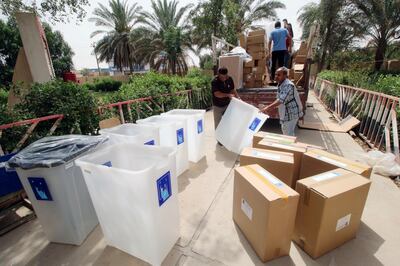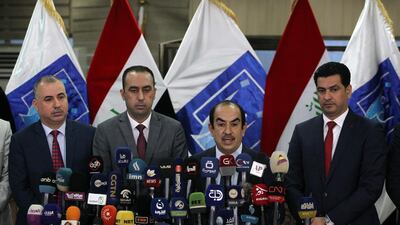Iraq's Judicial High Council on Thursday backed demands for a full manual ballot recount in a move that could further delay the formation of a new government.
Iraq's parliament on Wednesday ordered the nationwide recount of the May 12 votes and sacked the independent high electoral commission (IHEC) which oversaw the polls. The court said it will take over from the commission.
"Following the implementation of the third amendment law of the election law, the Judicial High Council is expected to meet on Sunday to select judges to supervise the manual recount," court spokesman Abdel Sattar Bayrikdar told The National.
__________
Read more:
Iraqi parliament demands vote recount
Angry Iraqi Kurds file election complaints with Baghdad
Iraq elections 2018: country readies for first polls since end of ISIS war
__________
The move calls into question the formation of a government, following the surprise election of Shiite cleric Moqtada Al Sadr’s Sairoun bloc, as well as the effectiveness of Iraq's democratic process.
However, added Mr Bayrikdar, the top judicial authority will act in a “fair and impartial manner to reassure the public that no parties or individuals will intervene or influence the council’s work.”
A committee of top judges on Thursday moved into the headquarters of the election commission ahead of the take over.
In response, the IHEC said it deems the move "illegal" and that it would appeal against the new law.
The commission's board will use its constitutional and legal right to appeal the amendment to the election law because it contains violations and is not in harmony with the constitution, IHEC said in a statement.
More than 170 MPs voted in an emergency parliamentary session on Wednesday to amend the law, which will also nullify votes from overseas and displaced persons' camps in four Sunni-majority provinces.

“The work of the council will be based on the complaints submitted [in regard to] the results of the electronic counting and voter manipulation," Mr Bayrikdar said.
But members of the Sadrist movement who boycotted the emergency session say the decision taken by parliament is unlawful.
"It violates the by-laws," Dhia Al Asadi, close aide to Mr Al Sadr and head of the Ahrar bloc in parliament, told The National. "The lawful procedures according to the IHEC and federal court should have been followed."
Mr Al Asadi expressed concern with the possibility that rival parties may be attempting to sabotage Mr Al Sadr’s victory.
“There was clear conflict of interest [with the outgoing MPs'] attempt to manipulate the parliament and legislate laws that will serve them,” he said.
The development follows the decision by Prime Minister Haider Al Abadi on Tuesday to ban some members of the country's electoral commission from travelling after "serious violations" were reported.
He said that a commission looking into the alleged irregularities in the elections found "widespread manipulation" and faulted election authorities for not taking the needed measures to eliminate these problems.
Mr Al Abadi held IHEC responsible for the alleged violations and called for criminal investigations.
The committee, which presented its findings to the cabinet this week, recommended a manual recount of five per cent of the votes to compare against the figures produced by electronic voting machines, which some fear could have been hacked. The committee also recommended cancelling the results from displaced persons camps and overseas voters.
Some experts noted that the bill passed by parliament was vastly more expansive than Mr Al Abadi's cabinet order.
"The bill calls for a 100 per cent recount. Al Abadi's order says 'no less than five percent'," Kirk Sowell, publisher of the biweekly newsletter Inside Iraqi Politics, told The National. "And in his press conference two days ago, he did note that the amendment was within the authority of parliament."
"If Al Abadi rejects the 100 per cent recount, then the bill is null and void," Mr Sowell said.
But despite being in a predicament less than a month after elections, some Iraqis remain optimistic.
"There is a positive reaction to the amended law because the extent of the fraud was unrealistic and within in an unprecedented public announcement," Lawmaker Jaber Al Jaberi, who was present at the session, told The National.
“Everyone is awaiting the results,” Mr Al Jaber said.


